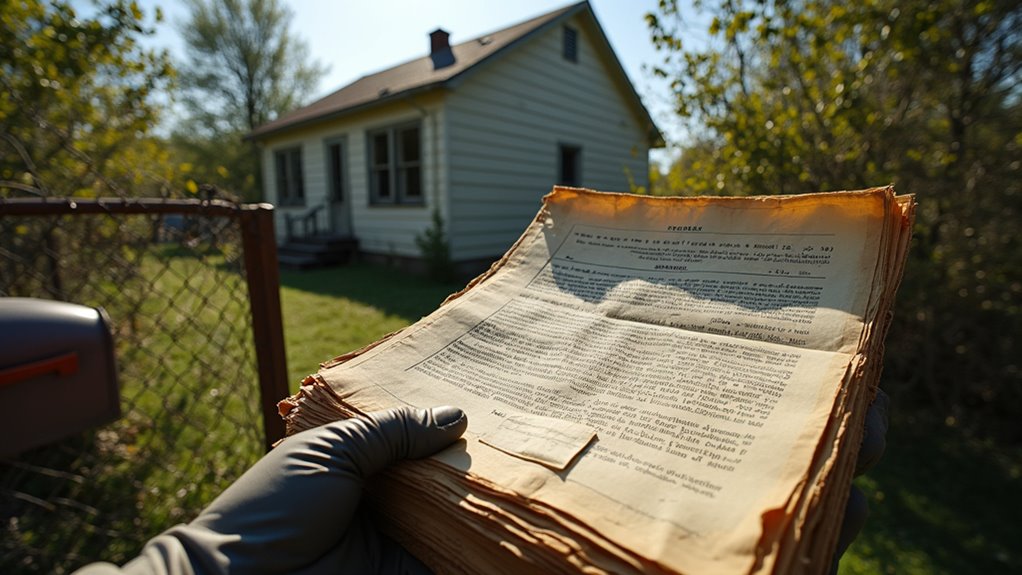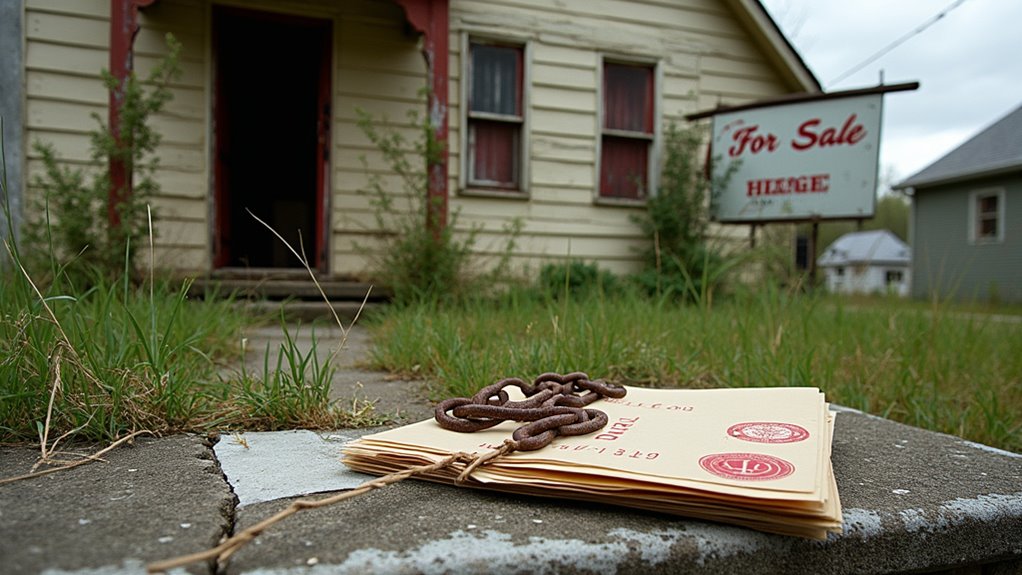Selling an abandoned property seems like a quick way to offload unwanted real estate. However, it comes with tough legal challenges that many sellers do not expect. Ownership, debts, and local laws can make the process much harder than selling a regular home.
These issues can cause costly delays or even prevent a sale. Unresolved title defects, hidden liens, or unclear inheritance can create serious trouble for sellers. Failing to address these legal hurdles may result in lost deals and future lawsuits.
To sell an abandoned property legally, you must clear up ownership, resolve debts, and follow local rules before listing. A real estate lawyer can help you avoid mistakes and protect your interests during the sale. This blog will guide you through each step and help you avoid legal problems.
Key Takeaways
- Clear legal ownership and title must be established before selling an abandoned property.
- All outstanding liens and code violations must be identified, disclosed, and resolved prior to sale.
- Proper probate procedures are required if the property was inherited or ownership is unclear.
- Full disclosure of all known property defects and environmental hazards is legally required.
- Eviction of squatters or unauthorized occupants must be handled through lawful processes before transfer of ownership.
Proving Legal Ownership

To sell an abandoned property, you must first prove you are the legal owner. Legal ownership requires documents such as the deed and property tax records. Probate or court documents may also be needed if ownership is unclear. If you are working with a local team, the process can be more straightforward and transparent. If you lack these documents, you cannot sell the property. All paperwork should be current and easy to verify. Outdated or incomplete records may lead to legal problems.
Once ownership is confirmed, you can get the property valued. A proper valuation helps you set a fair price. Buyers and their lawyers will check your proof of ownership before agreeing to buy.
It is also important to be aware of potential building code violations that can affect the sale process and may require disclosure or resolution before transferring ownership.
Clearing Title Issues
A clear title proves you have the legal right to sell an abandoned property. Buyers need this proof before a sale can happen. Without it, you cannot transfer ownership without risks.
Title defects must be fixed before selling. These may include mistakes in legal descriptions, missing heirs, or past ownership problems. If any of these exist, you must correct them first.
In Virginia, court approval before selling is often necessary to ensure compliance with state laws and protect heir rights, especially if there are potential title or probate complications. Clear up title defects like legal description errors, missing heirs, or old ownership issues before you try to sell.
Boundary disputes with neighbors can delay a sale. Legal action or an agreement may be required to fix these issues. You should solve all property line problems before closing.
Old zoning variances can affect your title. Check if any exist and if they were properly approved. Unresolved zoning issues may prevent a clear sale.
Title searches and surveys help find issues early. If the title is not clear, you may need a quiet title action in court. Taking these steps protects you from legal troubles after the sale. Additionally, working with professional services can help resolve complex title issues quickly and ensure a smoother transaction process.
Handling Outstanding Liens

You must first identify all existing property liens through a comprehensive title search to determine the encumbrances affecting marketability. Once identified, you’ll need to negotiate lien payoffs directly with creditors to enable a clear transfer of ownership. Securing proper lien release documentation is essential to legally extinguish these claims and protect both seller and buyer from future disputes.
In Virginia, full transparency about known defects and encumbrances, such as outstanding liens, is required to avoid legal complications and foster trust during the sale. Consulting with a title company or attorney can help ensure clear title transfer and that all legal requirements for lien resolution are met.
Identifying Existing Property Liens
Identifying existing property liens is important when selling an abandoned property. Liens are legal claims against the property for unpaid debts. They can include unpaid mortgages, taxes, or contractor bills.
A title search helps find any liens on the property. If you find a lien, the seller must notify the property owner and all buyers. Proper notification allows everyone to address the issue before closing.
Liens can lower the amount a seller receives from the sale. If you ignore liens, the sale may be delayed or canceled. Always ask a real estate attorney for advice if you find a lien.
Negotiating Lien Payoffs
Negotiating lien payoffs is required before you can transfer a clear title. Liens are debts secured by the property, and they must be paid. If you do not pay them, the sale cannot go forward.
You should contact each lienholder and request a payoff statement. This statement shows the full amount needed to clear the debt. Always check these statements for mistakes.
If the property’s value is low, you can try to settle for less than the full amount. All agreements with lienholders must be put in writing. Missing this step could cause future problems.
You also need to check the deed for other claims. Make sure all liens and debts are listed and resolved. This helps avoid legal issues after the sale.
Lien Release Documentation
Lien release documentation proves that a property is free from liens. This paperwork is necessary for a legal property transfer. If you do not have it, the title may still have legal claims.
Once you pay off a lien, request a lien release from the creditor. The document is often called a Satisfaction of Lien or Release of Lien. It must be notarized and recorded at the county office.
Make sure the release lists the correct property and lien amount. If you do not record this document, the title may be unclear. This can delay the sale or cause legal problems later.
Always get and record the lien release to protect your transaction. This step ensures a clear title for the buyer. It also helps avoid future disputes over the property.
Navigating Probate and Inheritance Laws

Even if a property is abandoned, you must follow probate and inheritance laws to sell it. These laws decide who owns the property after someone dies. If you do not follow these rules, you cannot transfer ownership. Abandoned property still requires probate and inheritance laws to be followed before ownership can be transferred or the property sold.
You need to check if the property must go through probate. Probate is a court process that confirms a will and transfers property to heirs. If there is no will, state laws decide who inherits the property. In Virginia, proper documentation is essential, including probate or trust documents, to legally transfer property ownership.
Heirs must be identified before you start selling the property. A clear title is required to complete the sale. You should also check for any liens or debts attached to the property.
Written consent from all heirs is important if there are multiple heirs. This prevents disputes after the sale. If the will is contested, the court must approve who has authority to sell.
Delays are common if probate takes too long. Acting quickly can help avoid missed opportunities. Understanding these steps helps ensure a smoother sale process. It’s also helpful to be aware of the financial aspects and costs involved in probate, as these can impact your decisions during the sale process.
Addressing Code Violations
You must fix any code violations on the abandoned property before selling. Towns may fine you for things like unsafe wiring or broken structures. These problems can lower the property’s value and make it hard to sell. Lenders and buyers often check for open code issues. If there are violations, you should contact local code officers right away. They will tell you what repairs are needed for compliance.
Consulting with a skilled real estate agent can also help you navigate code issues and ensure the property is properly prepared for sale. Keep records of all repairs and certificates you get. These documents help show the property is safe and ready to sell. If you ignore code violations, closing may be delayed or your sale price may drop. Addressing code issues promptly can also prevent legal complications that may arise during the sale process, helping to protect your financial interests.
Complying With Local Zoning Regulations

You must follow local zoning rules before selling an abandoned property. Zoning laws control how you can use the property. If you do not follow these rules, the sale may stop or become difficult.
Check your city’s zoning map to find out your property’s approved use. If the current or planned use does not match the zoning, you must apply for a variance or rezoning. This process usually needs public meetings and government approval. Sellers in Fishersville may benefit from as-is property sales if zoning requirements or property conditions make traditional selling challenging.
If the property has any zoning violations, you must fix them before selling. Some violations may require repairs or changes to the property. A real estate attorney can help you handle these steps if needed.
Before listing, make sure the property is clean and presentable, as boosting curb appeal can help attract buyers and smooth the sales process.
Disclosing Property Defects
You must fully disclose all known property defects before you sell an abandoned home. Laws require you to share any information that could affect the property’s value or a buyer’s decision. If you hide problems like mold or structural issues, you could face legal trouble.
Major defects, such as structural damage, can scare off buyers and lower the price. Environmental hazards often reduce the value even more. Problems with plumbing or electrical systems may also affect negotiations. In Virginia, selling a home as-is will usually result in offers that are lower due to existing issues, and buyers will expect to factor repair costs into their bids.
Roof or foundation issues can make lenders hesitate to finance the property. Always write down all defects you know about. If you are unsure about the rules, ask a lawyer to help you follow state laws.
Virginia requires sellers to follow strict state disclosure laws, ensuring buyers are fully informed about property damage, repairs, and any health or safety concerns before completing a sale.
Dealing With Squatters or Unauthorized Occupants

Squatters or unauthorized occupants can cause legal problems when selling an abandoned home. If someone lives in your property without permission, you cannot remove them by force. Laws require you to follow specific eviction procedures.
You must first check if these people have any rights to stay under local or state law. If they do, you need to serve a proper notice and keep records. Legal action may be necessary if they do not leave after notice.
Buyers want a home with no unwanted occupants, so you must resolve these issues before selling. Any attempt to remove people yourself can get you into legal trouble. Legal advice can help you avoid mistakes and protect your sale.
For owners looking to avoid these complications, selling to trusted cash home buyers can simplify the process since they often handle properties with such challenges directly.
Managing Environmental Hazards
You must identify any contaminated materials on the property and assess potential liability under federal and state environmental statutes. Ensure you comply with all applicable cleanup regulations, as failure to remediate hazardous substances can result in substantial penalties and impede the sale. Additionally, you’re legally obligated to disclose known environmental risks to prospective buyers, as nondisclosure may expose you to litigation.
Identifying Contaminated Materials
Abandoned properties often contain contaminated materials. Common examples include asbestos, lead paint, and underground storage tanks. These materials can create legal risks for sellers.
If you plan to sell, you should order an environmental assessment. Certified professionals can test for asbestos and other hazards. Improper removal can lead to health risks and legal issues.
Check building materials, soil, and visible debris for hidden hazards. Some substances are regulated by federal or state laws. Always document your findings with clear reports.
If you identify contaminated materials, you show you have done your due diligence. This can help protect you from future legal claims. Being proactive reduces your risk of costly disputes.
Compliance With Cleanup Laws
Sellers must follow all environmental cleanup laws before transferring abandoned property. These laws include federal rules like CERCLA and similar state laws. If contamination exists, you must clean it up as required.
Ignoring these rules can lead to heavy fines or lawsuits. Unresolved contamination lowers property value and scares away buyers. Proper cleanup is important for a successful sale.
You should hire certified environmental experts to inspect the site and manage any cleanup. Always keep records of the cleanup process and actions taken. These records may help in legal matters or during negotiations.
Disclosure of Environmental Risks
Sellers must tell buyers about any environmental risks they know or suspect. These risks can include soil contamination, asbestos, lead paint, or underground tanks. If you hide these problems, you may face legal trouble.
A full environmental check should be done before selling. If you find any hazards, keep records of fixes or cleanups. List all findings and actions in your disclosure papers.
State laws may have strict rules for these disclosures. You should learn your local laws before selling. If you follow these rules, you lower your risk of lawsuits and help buyers make informed choices.
Understanding Tax Implications
Tax obligations are important when you sell an abandoned property. You may need to pay taxes on any profit from the sale. The IRS requires you to report any gain or loss.
If the property was used for business or as a rental, you must report past depreciation. Depreciation may increase your taxable income. You will likely have to pay more taxes if you claimed depreciation.
Local and state governments may charge transfer taxes. These taxes depend on where the property is located. Payment timelines can vary by location.
You should talk to a tax professional for advice. They can help you meet all tax requirements. Professional guidance prevents costly mistakes.
Obtaining Necessary Permits
You need to get the right permits before selling an abandoned property. The local government usually requires a permit application and an inspection. This inspection checks if the building follows current codes and safety rules.
Zoning approval is also needed for the sale. If the property’s zoning does not match the buyer’s plans, you cannot sell it. Always check if any old permits have expired or if new rules apply.
If you skip these steps, you may face legal problems, fines, or even lose the sale. Municipal offices can help you through the permit process. Proper permits make sure the sale is legal and valid.
Notifying Interested Parties
Before you sell an abandoned property, you must notify everyone with a legal interest in it. These parties include lienholders, heirs, and previous owners. This step is necessary to follow the law and avoid future disputes.
Certified letters should be sent to all known lienholders. These letters are official and can be tracked for legal proof. If you do not send these letters, you may face legal problems later.
A public notice should be published in a popular local newspaper. This helps reach unknown heirs or claimants who may have rights to the property. If someone responds, you must keep a record of their reply.
It is important to keep written records of all notifications and responses. These records will protect you if legal questions come up later. Always refer to your property valuation and market analysis when sharing information, as these documents show transparency and value.
Working With Real Estate Agents and Attorneys
You need to select a real estate agent with experience in distressed or abandoned properties to ensure compliance with disclosure laws and marketability standards. Retain a qualified attorney to clarify title defects, resolve liens, and interpret statutory requirements. Both professionals will guide you through contract negotiation, due diligence, and the execution of legally binding documentation.
Agent Selection Criteria
To protect your interests during the sale of an abandoned property, you must choose the right professionals. The agent should have the right qualifications and experience with abandoned properties. If you select someone with these skills, your risks will be lower.
You should check if the agent holds a valid state license and any extra certificates for handling distressed properties. If an agent has experience with abandoned properties, they can handle issues like title defects or code violations. Their background should show successful cases and solutions to problems.
References from past clients can help you judge the agent’s reliability. If you read reviews, focus on their skills in handling legal issues. A good agent can negotiate and solve problems that come with abandoned properties.
Attorney Roles Explained
A real estate attorney helps you handle the legal side of selling an abandoned property. The attorney checks who owns the property and makes sure you are allowed to sell it. If you want to avoid legal trouble, you should hire an attorney early in the process.
The attorney will look for problems with the title, such as liens or claims. He or she checks that all property laws are being followed. If any issues come up, the attorney works with your real estate agent to solve them.
Attorneys also look over contracts and make sure your interests are protected. They can help you negotiate offers and handle any disputes. If the property has risks or special legal problems, the attorney will explain them to you.
Below is a table that shows main attorney roles in abandoned property sales:
| Attorney Role | Description |
|---|---|
| Legal Ownership Verification | Confirms rightful ownership and authority to sell |
| Title Examination | Identifies liens, claims, or encumbrances on the property |
| Statutory Compliance | Ensures adherence to local, state, and federal property laws |
| Negotiation | Advocates for your interests in offers and counteroffers |
| Risk Assessment | Advises about liabilities specific to abandoned property sales |
Navigating Legal Documentation
After you understand what the attorney does, you must handle the legal paperwork for selling an abandoned property. Legal documents are necessary to complete the sale and protect your interests. If you miss any step, there could be problems later.
You should work with both a real estate agent and an attorney. The real estate agent can help you know the property’s value and current market conditions. An attorney checks that all documents follow local laws.
A title search is needed to confirm ownership. If there are any liens or claims, these must be resolved first. You cannot sell the property until the title is clear.
You also need to prepare disclosure documents. These forms tell buyers about the property’s condition. If you do not give proper disclosures, you may face legal trouble later.
A sales agreement is the final step. This contract sets the terms of the sale and includes the price. If the agreement is not clear, disputes can arise after the sale.
Careful attention to each document protects you from future problems. Legal and real estate experts can help you avoid mistakes. If you are unsure, always ask for professional advice.
Finalizing the Sale Transaction Properly
To finalize a sale, you must follow all legal steps. The purchase agreement should match the property’s actual value. Any mistakes here can cause legal problems.
A real estate attorney should review every contract. The attorney checks for state law compliance, including disclosures and ownership transfer rules. Proper review helps prevent disputes later.
During closing, all taxes, liens, and debts must be paid. You need to give the buyer a clean title. Signed closing statements and deed recording are required.
If you follow these steps carefully, you lower your risk of future problems. Proper documentation protects both buyer and seller. This keeps the sale legal and fair.
Conclusion
If you plan to sell an abandoned property, you must understand the legal challenges involved. If you overlook title issues or liens, the sale could face serious delays or legal problems. If you want a smooth transaction, you should always perform careful due diligence.
If you need to sell quickly, we buy houses for cash, including abandoned properties. If you work with us, our team at Align Real Estate Solutions will handle the legal details. If you want to avoid complications, we can make the process simple and worry-free.
If you are ready to sell, contact Align Real Estate Solutions today. If you have questions, we are here to help and provide a fair cash offer. If you want a fast, reliable sale, let us assist you every step of the way.
Author
-

Zach Koops is co-founder and Real Estate Success Manager at Align Real Estate Solutions, serving homeowners across Virginia since 2024. With a passion for real estate and a heart for people, Zach has built his career around helping sellers navigate tough situations—foreclosure, inheritance, relocation, repair-overload—with clarity and compassion. He’s known for being straightforward, steady under pressure, and deeply invested in relationships. Outside of work, he spends his time as a husband and father, enjoys the outdoors in Shenandoah Valley, loves singing on stage, and constantly seeks growth through reading and new experiences.









